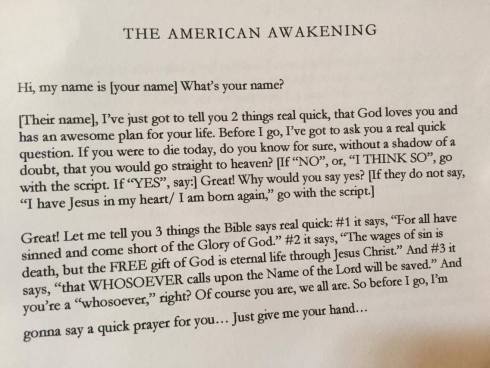In this fifth part of my series, ‘The Stages of Spiritual Growth’, we come to Stage 3 – the ‘Synthetic, Conventional Stage’.
I may as well tell you now, this Stage will be familiar to most of my readers – probably all – because you will either be conscious of having passed through this Stage, or you may recognise that you are still in it. Many people don’t even realise they are in this Stage – for reasons that we will see – until after they have passed through it. I’d say that this is the Stage that many Christians in the Western world are in. And that’s fine, because as I said before, God has His own timing for all of us for our spiritual growth, and this is not something to be rushed.
I therefore want to be very sensitive in writing this piece, and the next two pieces as well, because these three essays will certainly be the key instalments in this series. Indeed, this is one of the dangers of knowing about these Stages; that we may feel like we are not moving fast enough or something. But remember what I wrote in the Spoiler! piece: these Stages are generalisations and are actually representative of no one particular person’s position. This is not a competition, nor is it a race (despite various Scriptural usages of a ‘race’ as an illustrative point)! This is the walk of discipleship with Jesus Christ. The only thing to realise is that this is simply a Stage, and you have not ‘arrived’. None of us will ‘arrive’ this side of the veil, if even then. Simply realise that there are others who have gone through this Stage; we will talk about those people more in the next piece. As I said in the closing statements in the ‘Spoiler!‘ piece, where I try to put the Stages of Spiritual Growth into perspective,
“I’m not saying that these ‘Stages’ are definitive, and (as I have already mentioned) they are to some extent a generalisation. But I must say that I can definitely identify with these Stages of growth in my own mind, and at the very least, these ideas should confirm for us that there are indeed spiritual growth stages of some sort out there, and that if we find ourselves changing under God’s guidance, we should not be surprised when we can indeed identify with some of the indicators of the Stages put forward by Fowler/Peck. So, when I am presenting and describing these Stages from both Fowler and Peck, I am not asking my readers to try to decide at any time which Stage they are in – although I realise this is a natural tendency – nor am I encouraging anyone to feel ‘superior’ or ‘inferior’ to other Christians because of the ‘stage we are at’. This isn’t about others; this is about realising that we are all on a journey, that these Stages do exist in some form or another in most people, and that this is perfectly normal and nothing to be afraid of. Indeed, I am not proposing that anyone be constantly mindful of the Stages and/or ‘trying to work out where we are on the scale’. While introspection can be useful, I would far rather we are simply aware of these Stages as a perfectly normal part of personal spiritual development, as information that is useful in working out what is happening to us, but all the while still majoring on keeping our eyes fixed on “…Jesus, the Author and Finisher of our faith” (Heb 12:2). He’s the important One!”
Furthermore, not everyone will identify with this concept of ‘Stages’. And that’s fine too; faith certainly is not a ‘one size fits all’ kind of thing!
I would suggest that two more Scriptures we need to keep in mind as we read, then, are these:
“Being confident of this very thing, that he which hath begun a good work in you will perform it until the day of Jesus Christ” (Phil 1:6 KJV)
“Now unto Him that is able to keep you from falling, and to present you faultless before the presence of his glory with exceeding joy…” (Jude 24 KJV)
Remember, it is Jesus Who performs the work in us, and He will continue it to completion. God does not make mistakes.
Right then, here we go:
Stage 3
To quote from the Stage 3 part in the chart of Fowler’s Stages, “Most people move on to this stage as teenagers. At this point, their life has grown to include several different social circles and there is a need to pull it all together. When this happens, a person usually adopts some sort of all-encompassing belief system. However, at this stage, people tend to have a hard time seeing outside their box and don’t recognize that they are “inside” a belief system. At this stage, authority is usually placed in individuals or groups that represent one’s beliefs. [This is the stage in which many people remain.]”

A person will normally move into the third of James Fowler’s Stages, the Synthetic, Conventional stage around puberty (although it could happen at any time, even their late teens) but, apparently, many adults never move beyond it. Fowler estimated that 30% of adults remain at this stage.
People in this Stage most often hold to ‘…a set of tacitly held, strongly felt, but largely unexamined beliefs and values’. Here authority is located outside the self – in the church leaders, in the government, in the social group. When Fowler says that religious concepts are “tacitly” held, he means that the person is not fully conscious of having chosen to believe something. Thus the name “Synthetic” – beliefs are not the result of any type of analytical thought. This stage is also synthetic in the sense that it weaves together faith out of a variety of sources, in a synthesis: Fowler describes part of the work as learning to ‘form a story of one’s stories’. People who ‘convert’ to a Stage 3 position, from a background of not having much education in the matters of a certain faith structure, will tend to ‘absorb’ the belief systems from their peers by attending meetings, listening to talks, teaching and testimony, and from reading their holy books.
The Stage is ‘Conventional’ in that faith is at this stage formed in a social or group context (e.g. family/gang/church), and the individual follows the norms of the group, rather than adopting particular views after thinking them through for themselves. “Conventional” therefore means that most people in this stage see themselves as believing what “everybody else” believes and would be reluctant to stop believing it because of the need they feel to stay connected with their group.
It turns out that most of the people in traditional churches are at this stage. And in fact, Fowler comes right out and states that religious institutions “work best” if the majority of their congregation is in Stage 3. And that could indeed explain a lot of the preaching we hear about that appears to be intended to discourage people from questioning. To properly assure their continuance, churches apparently need people to remain in Stage 3.
People in this stage place a large amount of trust in external authority figures and tend not to recognize that they are within a belief system “box” as their beliefs are internalized but have not been examined. We are immersed in the ‘thought system’ of our faith community in a similar way to a fish that does not perceive the water it which it swims. This is one of the main reasons why most people in this Stage do not realise that they are in it, until they have grown beyond it.
This is therefore a ‘conformist’ Stage in which the individual is acutely attuned to the expectations and judgements of significant others – leaders, ‘spiritual fathers’, and so on. It is also a ‘tribal’ stage, where being part of the tribe is powerfully significant to the person – and being in a community of like-minded believers. They usually hold deep convictions and are loyal and committed workers and servants. Beliefs are typically not examined critically and are therefore tacitly held to. That is, they know what they know but are generally unable to tell you how they know something is true, except by referring to an external authority outside of themselves – “The Bible says” or “My Pastor teaches this”. Any attempts to reason with a person in this stage about his beliefs, any suggestion of demythologizing his beliefs, is seen as a threat.
Often, people in this Stage predominantly have a vision of God as an external, transcendent being with little reference to God as an immanent, indwelling God. Among adults, this is the Stage most commonly found amongst church members. Most find enormous meaning in their faith, as they share in church activities – worship, prayer, mission, teaching etc. Many express a strong sense of belonging, “being at home” or having “arrived”. Emphasis is on the “family of believers”.
Dualistic thinking is very prevalent: Christian/non-Christian; saved/unsaved; heaven/hell; black-and-white thinking, along with being a part of, and being accepted by, the faith community.
In this way, most people in this Stage feel comfortable, safe and secure ‘in their faith’ on the surface, as long as they do not look too deeply at their questions, if indeed they have any. This is because they have a set of lines drawn; a set of well-defined boundaries, maybe rules, expectations both written and unwritten, taboos, and tacit, shared beliefs, and a social structure based on those shared beliefs, within which they feel safe. It is a paradox that, whereas most religious belief systems encourage complete openness, honesty and trustworthiness, in fact many people have to hide their ‘doubts’ or questions and effectively have to lie about, or at least conceal, their true feelings. Therefore, if/when tricky questions arise, these have to be either pushed down or ignored, but the questions can’t be asked. This is because despite the claimed openness of the group, the person may be (and usually is) afraid of rejection by the group, maybe because such questions are frowned upon since a tacit belief is held that such questions are unhealthy and show a ‘lack of faith’. In fact, any rejection would usually occur because the questions threaten the belief systems – and therefore the security and cohesion – of the group, most of whom, remember, will likely also be people in Stage 3. In addition, the security found in the ‘knowledge’ that a person has in this Stage, is, quite rightly, tightly held, because at this point, letting go of those tightly-held beliefs is a terrifying prospect; this is true especially if the context is one where ‘eternal damnation’ is the perceived penalty for ‘going against the grain’ in the group. Most people who remain in their environment like this are therefore content to live with/ignore their questions, and just get on with their lives, including church activities.
Therefore, whereas, as we have already said, a person will normally move into this Stage sometime between puberty and their late teens, many adults never move beyond it. This will come as no surprise to people who have engaged in ‘discussion’ with people in the ‘Synthetic – Conventional’ Stage.
Either having no questions, or suppressing them if/when they do have them, is one of the main reasons why many people do not move any further forward from Stage 3. We feel safe there, and we don’t want to ‘rock the boat’. And actually that is admirable in some ways, because there is a concern there for the well-being of the others in the group. The transition to Stage 4 almost always involves facing into dissatisfaction, awkward questions, or other such disillusionment, and this is always uncomfortable at some stage, as we shall see.
There are many positives to this Stage. Most people in this stage are genuinely happy; happy with their lives, happy in their faith, happy knowing God in the way that they do. Churches are usually involved in some way with making the world a better place to live in; maybe they want to ‘make a better world’. They work with the poor, they work to better society by taking up political posts in order to perpetuate their beliefs into societal structures. They are sincere, they are honest, they are trustworthy, they are usually kind and generous to others – surprisingly, even sometimes when those they are being kind to are members of ‘forbidden’ groups, like gay people or other types of ‘sinners’ as they see them.
Personally, for example, when I was in this Stage, I found that although I was a die-hard Fundamentalist and stood very firmly against people with ‘alternative sexualities’, when I actually met such a person, I just loved that person as God loves them. The story is here. I do not deny that the love of God is present in most of the people at this Stage; I just don’t think they quite know how to express it because they are hindered by the taboos of their belief structure. Jesus had no such scruples. Jesus associated with those whom society – and remember it was a religious society – had rejected and had cast on to the rubbish heap. But still He loved them.
Now let’s have a look at how Peck describes this Stage. In his system, he refers to it as Stage II:
Peck’s Stage II
Peck makes more valid points in his Stage II, which will enrich our understanding of Fowler’s Stage 3. Although it can be seen as reading quite harshly, this passage does make some excellent and perceptive, if possibly disconcerting, points:
“Formal, Institutional, Fundamental. Beginning the work of submitting themselves to principle – the law – but they do not yet understand the spirit of the law, consequently they are legalistic, parochial, and dogmatic. They are threatened by anyone who thinks differently from them, as they have the “truth,” and so regard it as their responsibility to convert or save the other 90 or 99 percent of humanity who are not “true believers.” They are religious for clear cut answers, with the security of a big daddy God and organization, to escape their fear of living in the mystery of life, the mystery of uncertainty in the ever moving and expanding unknown. Instead they choose the formulations, the stagnation of prescribed methods and doctrines that spell out life and attempt to escape fear. Yet these theological reasonings simply cover over fear, hide fear and do not transcend it in spite of with acceptance in expanding movement. All those outside of Stage II are perceived to be as Stage I, as they do not understand Stage III and Stage IV. Those who do fall, reverting from Stage II to Stage I are called “backsliders.”
“There is a [four famous Fundamentalist preacher names, removed because I don’t like to denigrate people – Ed] mentality (one-sided thinking – ignorance that produces hostility) in every religion, the one-sidedness, in every ideology. Christianity cannot be condemned as responsible for the fundamentalists who claim to represent such. One just has to look at Mother Teresa or Martin Luther King, Jr. to see the opposite of such thinking. You can find the [Fundamentalist preacher name] in Hinduism, Judaism, Buddhism, Jainism, Mohammedism and of course Christianity. That is the narrow one-sided exclusiveness that limits insight to one set of rules and one objective truth, under the literal logic or rationialism, that fails to apprehend the unseen intuitive essence of existence and ignorantly labels outsiders as misled sinners, while surrounding themselves with interior neurotic and finite walls of security and certainty. All is safe in this illusion, but all is not just, nor fair, and does not transcend prejudice that surpasses tribal identity, an identity that must be scrapped in order to bring higher consciousness of planetary cultural peace and love based on principle with intuitive insight.
“There is also a [name of a famous ‘terrorist’ leader] (evil intolerance) in every religious culture and teaching, in every social, political and cultural view. Islam cannot be condemned as responsible for the extreme fundamentalists who incorporate harm and war. One just has to look at the other side within Islam, to the Sufi of compassion and peace, that of Bawa Muhaiyaddeen or Hazrat Inayat Khan. Yet the evil of extreme fundamentalism resides in all facets of society, those who would kill and destroy, torture and humiliate, all in the name of their theological and ideological views. They are of course the extreme fundamentalists, yet all forms of fundamentalism, both moderate to extreme, Stage II mentality, fails integration with non-acceptance, that of one-dimensional perception.” (1)
While, as I said, this looks quite harsh, remember that these Stages are not intended to describe any particular set of people or any individuals. While we may recognise some or indeed many of these traits in people or churches we know, I am absolutely sure that most people do not hold any of these points of view with any sort of malice or ill feeling. They are simply acting out of what they believe. Remember that this is all perfectly normal when we are thinking about spiritual development.
Peck then expands on these ideas:
“…There are several things that characterize the behavior of men and women in Stage II of their spiritual development, which is the stage of the majority of churchgoers and believers (as well as that of most emotionally healthy “latency” period children). One is their attachment to the forms (as opposed to the essence) of their religion, which is why I call this stage “formal” as well as “institutional.” They are in fact sometimes so attached to the canons and the liturgy that they become very upset if changes are made in the words or the music or in the traditional order of things. It is for this reason that there has been so much turmoil concerning the adoption of the new Book of Common Prayer by the Episcopal Church or the changes brought about by the Vatican II in the Catholic Church. Similar turmoil occurs for similar reasons in the other denominations and religions. Since it is precisely these forms that are responsible of their liberation from chaos., it is no wonder that people at this stage of their spiritual development become so threatened when someone seems to be playing footloose and fancy-free with the rules.”
“Another thing characterizing the religious behavior of Stage II people is that their vision of God is almost entirely that of an external, transcendent Being. They have very little understanding of the immanent, indwelling God–the God of the Holy Spirit or what Quakers call the Inner Light. And although they often consider Him loving, they also generally feel He possesses–and will use–punitive power. But once again, it is no accident that their vision of God is that of a giant benevolent Cop in the Sky, because that is precisely the kind of God they need–just as they need a legalistic religion for their governance.” (1)
So, how do we use this knowledge?
For anyone reading this far, you will have noticed that these descriptions and discussions of Stage 3/II are quite revealing, and maybe it feels uncomfortable for you – either because you recognise traits that you yourself have, or you see traits that you used to have and it makes you feel uncomfortable, or maybe you don’t identify with any of it. All of these reactions are perfectly ok; I am not making any value judgement on where you are ‘at’ in your spiritual walk, and neither should you. The point is that we are aware of these different Stages, and how they sometimes manifest themselves, and to realise that this is to a great extent what makes people respond in the ways they do when talking about the things of faith. Everyone’s faith is different; even those who are in a ‘conformist’ stage will each believe something slightly different from his neighbour. And that’s fine. God causes His sun to shine on the righteous and unrighteous alike, and just because people in a certain denomination or faith tradition can feel the Presence of God in their meetings, in their lives, or whatever, it does not mean that they have everything taped as far as doctrine or belief goes. My own personal view – and you may or may not agree – is that God loves everyone, and He loves to make Himself known to them, and that He’s not particularly bothered what they believe as long as their hearts are turned towards Him. This may be seen by some as threatening to their belief system, but the thing to realise is that just because others’ belief systems ‘work’ for them, it doesn’t mean that yours is somehow ‘wrong’. It isn’t wrong; it’s what you believe. Now, granted, many of us believe many things about God which are incompatible with others’ beliefs, and some will indeed be correct and some will not, if indeed we can make such an assertion about knowledge of the infinite. But it is not for us to say that others’ belief systems are in any way invalid, because, for those others, they work.
For instance, Jesus said, “I am the Way and the Truth and the Life; no-one comes to the Father except through Me” (John 14:6). I believe that. But I also believe that those who come to the Father in other faiths also come through Jesus, it’s just that they don’t yet realise that this is the case. In Romans 3:23, St. Paul indeed says, “for all have sinned and fall short of the glory of God” – and many believers incorrectly stop short of the second part of the Hebrew poetry-style writing and omit the next crucial part of the verse: “…and [all] are justified freely by his grace through the redemption that came by Christ Jesus”. That sounds like a Universalist perspective, I appreciate, but that’s what it says. Who are we, then, to tell others that their experience of God is not valid? To me, that’s the height of arrogance – but having seen how dogmatic people can be, it is unsurprising.
At Stage 3, we need the humility to realise that we have not yet ‘arrived’; indeed, if we feel we have, then we most certainly haven’t! God wants to take us further – but all in His own good time. This stuff can’t be contrived, nor can it be rushed.
St. Paul also has some practical advice about how to cope with different stages of growth. Although the concept probably hadn’t been formally recognised at that point in history, it’s clearly something that was on Paul’s mind in Romans chapters 14 and 15. In there, people are passing judgement on one another because some were more free than others, and hurt was flowing both ways. There’s more on these ideas in my piece, ‘How Not to Cause Others To Stumble‘
And don’t let anyone judge you by anything that you find acceptable, when they do not, or vice versa (Col 2:16) – it’s not their place to do so and neither is it yours. It may be disguised as ‘loving concern’, but the vast majority of the time, people wanting to change something about what you believe is as a result of them judging you, and they will keep on doing so if they get the opening. But you can choose to respond gently and lovingly. This is the key – take Paul’s advice that he puts in so many of his letters – bear with one another in love and all that sort of thing.
And don’t worry – trust God to bring you through, and to bring your brother or sister through too. Part of trusting God is to let go of the things that you feel are so important that you have to sort them out yourself.
Maintain a sense of humour. Learn to laugh at yourself and not take yourself – or life – too seriously. This was one of the things that the humourless religious elite of Jesus’s time had a problem with. One of the first things to be lost in any legalistic setting, whether it’s a church or a totalitarian state, is the sense of humour. Legalists love to be sense of humour police, amongst other things. This is one reason why the attempted imposition of legalism on those who are free is so repulsive; they are trying to drag you back to where they are. Remember that, if you are being so dragged, and also remember – and stop it – if you are the one doing the dragging. Live and let live. Let people follow their own walk with Christ!
If you learn nothing else from this series, the thing I want you to hold above everything else is that you can trust God. If He is for us, who can be against us?
Let’s finish with Fowler’s formal description of this Stage:
“In Stage 3 Synthetic-Conventional faith, a person’s experience of the world now extends beyond the family. A number of spheres demand attention: family, school or work, peers, street society and media, and perhaps religion. Faith must provide a coherent orientation in the midst of that more complex and diverse range of involvements. Faith must synthesize values and information; it must provide a basis for identity and outlook.
“Stage 3 typically has its rise and ascendancy in adolescence, but for many adults it becomes a permanent place of equilibrium. It structures the ultimate environment in interpersonal terms. Its images of unifying value and power derive from the extension of qualities experienced in personal relationships. It is a “conformist” stage in the sense that it is acutely tuned to the expectations and judgments of significant others and as yet does not have a sure enough grasp on its own identity and autonomous judgment to construct and maintain an independent perspective. While beliefs and values are deeply felt, they typically are tacitly held-the person “dwells” in them and in the meaning world they mediate. But there has not been occasion to step outside them to reflect on or examine them explicitly or systematically. At Stage 3 a person has an “ideology,” a more or less consistent clustering of values and beliefs, but he or she has not objectified it for examination and in a sense is unaware of having it. Differences of outlook with others are experienced as differences in “kind” of person. Authority is located in the incumbents of traditional authority roles (if perceived as personally worthy) or in the consensus of a valued, face-to-face group.
“The emergent capacity of this stage is the forming of a personal myth-the myth of one’s own becoming in identity and faith, incorporating one’s past and anticipated future in an image of the ultimate environment unified by characteristics of personality.
“The dangers or deficiencies in this stage are twofold. The expectations and evaluations of others can be so compellingly internalized (and sacralized) that later autonomy of judgment and action can be jeopardized; or interpersonal betrayals can give rise either to nihilistic despair about a personal principle of ultimate being or to a compensatory intimacy with God unrelated to mundane relations.
“Factors contributing to the breakdown of Stage 3 and to readiness for transition may include: serious clashes or contradictions between valued authority sources; marked changes, by officially sanctioned leaders, or policies or practices previously deemed sacred and unbreachable (for example, in the Catholic church changing the mass from Latin to the vernacular, or no longer requiring abstinence from meat on Friday); the encounter with experiences or perspectives that lead to critical reflection on how one’s beliefs and values have formed and changed, and on how “relative” they are to one’s particular group or background. Frequently the experience of “leaving home” – emotionally or physically, or both – precipitates the kind of examination of self, background, and lifeguiding values that gives rise to stage transition at this point.
“The movement from Stage 3 to Stage 4 Individuative-Reflective faith is particularly critical for it is in this transition that the late adolescent or adult must begin to take seriously the burden of responsibility for his or her own commitments, lifestyle, beliefs and attitudes. Where genuine movement toward stage 4 is underway the person must face certain unavoidable tensions: individuality versus being defined by a group or group membership; subjectivity and the power of one’s strongly felt but unexamined feelings versus objectivity and the requirement of critical reflection; self-fulfillment or self-actualization as a primary concern versus service to and being for others; the question of being committed to the relative versus struggle with the possibility of an absolute.” (2)
References
Wikipedia’s page on James W Fowler
Wikipedia’s page on M. Scott Peck
Website of Margaret Placentra Johnston
Richard Cooke – Stages of Faith: a Tool for Curing Souls
Bill Huxley’s blog page on Fowler’s Stages of Faith
1. The Stages Of Spiritual Growth, by M. Scott Peck, M.D. (The Different Drum by M. Scott Peck, pages 187-203) – Abridged by Richard Schwartz
2. James W. Fowler, Stages of Faith: The Psychology of Human Development and the Quest for Meaning. Harper San Francisco, 1995, p.121


















